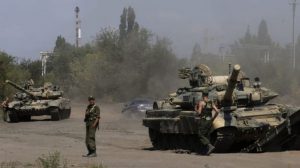Eurasia Diary presents an interview with Maksym Khylko, is a Director of Russian and Belarusian Studies Program, Foreign Policy Council “Ukrainian Prism”.
In his interview, Ukrainian expert touched upon the current developments around the Russian-Ukraine conflict, the prognoses of NATO experts on the threat of Russian aggression in Eastern Europe and the response of the Western alliance against Russian intervention in Ukraine.
– According to the experts of NATO on military strategy, the Russian army, in the third phase of its possible military action in Ukraine, will launch a serious attack on Kyiv from the northern direction. In this case, Russia will force Kyiv to sign the capitulation agreement, and Moscow will create the puppet entity in the territory of Ukraine serving its imperial interests. First, how do you assess the predictions of NATO expert on Russian aggression and the future security of Ukraine? To what extent the reports of NATO on Ukraine are true?
– I do not think that the Kremlin will really dare to wage a large-scale war and try to occupy two thirds of Ukraine’s territory, including Kyiv, because it would become a political, economic and military catastrophe for Russia. This would lead to many thousands of casualties among the Russian soldiers and the corresponding discontent of Russian society, as well as really severe economic sanctions from the West. In addition, no puppet or openly pro-Russian government can be established in Kyiv because the local population will not accept it.
Most likely, the Kremlin wants to achieve political goals by threatening military force on the border with Ukraine, and partly it has already got some of them. First of all, it is about the fact of holding a new meeting with Biden, which Putin really wanted and which will soon take place in video format.
The Kremlin hopes that the threat of war will force Kyiv and its Western partners to make unilateral concessions, such as reducing the supply of Western weapons to Ukraine, implementing the Russian vision of the Minsk agreements, and launching Nord Stream 2. Putin would also like to use the threat of military force to put pressure on Kyiv and force the authorities to make mistakes that could lead to political destabilization in Ukraine.
So, the goals are mostly political, but of course, when there are a lot of armed forces on the border, there are always risks of escalation, which can lead to local hostilities or even to something worse.
– Do you think that one of the main strategic interests behind the possible invasion of Russia of Donbas and Luhansk regions of Ukraine is the creation of the corridor through eastern Ukraine to ensure the connection between Crimea and the mainland of Russia?
-Such a risk is always possible, although doing this right now would not be very logical for the Kremlin. The situation with water resources in Crimea is better now than it was in the summer, and the Kremlin wants to launch Nord Stream 2 soon − and a new escalation against Ukraine is not the best way to facilitate this.
– The US President Joe Biden said in his speech that he was in constant contact with US allies in Europe. As well, he is working on a set of initiatives to make it difficult for Russia to carry out the possible invasion of Ukraine. Moreover, the US Secretary of State Antony Blinken stated that Russia would face the most serious consequences in terms of the intervention of its armed forces in the eastern territories of Ukraine. Please tell us, to what extent the United States and its allies in Europe would be ready to retaliate against Russian intervention in Ukraine? What kind of serious political and military measures will the US and European Union carry out against Russian aggression?
-The response of the U.S. and the EU will depend on the scale of the possible escalation. If it is local, for example on the contact line in the Donbas, where Russia can present it as the actions of its proxies from the so-called “DPR” and “LPR”, then the West’s response will be less harsh. But if Russia dares to wage a large-scale war, there will be tough economic sanctions, a refusal to launch Nord Stream 2, and possibly even a disconnection of Russia from SWIFT. The question of Russia’s responsibility for the aggression will be raised at the UN level. The U.S. will step up arms assistance to Ukraine, and the EU will have to start switching to sources of hydrocarbon imports other than Russia.
– Do you think that the military attack on Ukraine in any way could swamp Russia in the catastrophic political and economic failure?
-In the event of a large-scale attack, yes. Most Russians will not support a large-scale war against Ukraine, which will result in the deaths of thousands of Russian soldiers and harsh economic sanctions from the West. There will be no repetition of the “Crimea-is-ours” euphoria effect − on the contrary, it will be very difficult for Putin to convincingly explain to the Russian society what all the losses will be for. Even an authoritarian regime needs some public support, and a large-scale war against Ukraine could cost Putin too dearly. This could turn out to be a disaster for Russia in the military, economic and political dimensions and destroy Putin’s plans for political transit.
Yunis Abdullayev



